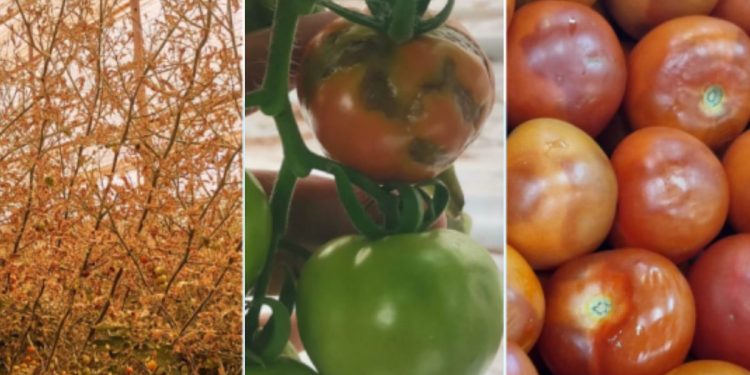Integrated Pest Management Faces Challenges Amid Rising Infestation
Moroccan tomato plantations are under severe threat from Tuta Absoluta, an invasive moth species causing significant crop losses. “No grower has been spared, and everyone struggles to contain the problem,” reports Oussama Machi, an early vegetable grower based in Agadir.
Since 2008, Moroccan tomato growers have battled Tuta Absoluta. While generally manageable, the pest periodically causes widespread devastation, as seen in 2015 and now again this year. “Losses are of the order of 20% of the tonnage produced, rising to 35% if combined with Tobrfv, and can go as far as the complete uprooting of plants, a frequent scenario. And here I’m talking about farms with exemplary cultivation practices and major prevention efforts, for without them losses wouldn’t fall below 70%,” explains Machi.
The recent surge in Tuta Absoluta infestation is attributed to changes in integrated pest management (IPM) practices, particularly pesticide resistance. “The insect has developed considerable resistance to authorized pesticides such as chlorantraniliprole and abamectin,” Machi notes. Additionally, European regulations have reduced the number of allowed active ingredients, further complicating the situation. The exclusion of effective pesticides containing Spinosad has accelerated the pest’s spread, exacerbated by this summer’s heat and humidity.
Compounding the issue is the reluctance of growers to utilize biological control methods. “Moroccan farmers often believe that biological control contributes to the spread of ToBRFV because the insects used are mechanical vectors of the virus,” says Machi. Despite the lack of firm scientific evidence, this belief has led to hesitation in adopting comprehensive IPM strategies, which remain the most effective means of controlling Tuta Absoluta.
Fortunately, the infestation’s impact on the export campaign is minimal as it occurs at the end of the Moroccan season. The local market also sees negligible effects since the insect is not aggressive in open fields, the primary source of round tomatoes for domestic consumption. However, greenhouses, particularly in the Agadir region, are significantly affected, with cherry and elongated tomatoes being the hardest hit.
The Tuta Absoluta outbreak’s influence on future planting decisions is uncertain. Last season’s disruptions due to ToBRFV and extreme heat waves delayed the start, and similar concerns loom for the upcoming season. Machi remains optimistic: “Early tomatoes have been very profitable this season and remain very attractive despite the risk. I believe there will be no influence on the precocity of the campaign.”
The immediate future will reveal whether IPM practices exacerbate ToBRFV spread and whether this fear impacts the launch of the next growing season. As planting decisions are being made now, the coming weeks will be crucial in determining the course of Moroccan tomato production.































